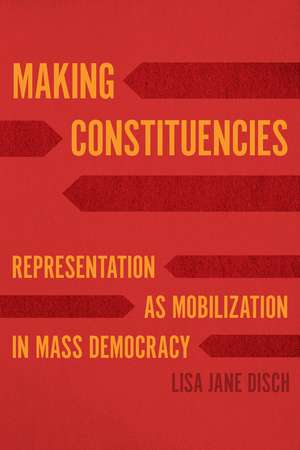Making Constituencies: Representation as Mobilization in Mass Democracy
Autor Lisa Jane Dischen Limba Engleză Paperback – 12 noi 2021
Since the turn of the twenty-first century, the idea of a divided United States has become commonplace. In the wake of the 2020 election, some commentators warned that the American public was the most divided it has been since the Civil War. Political scientists, political theorists, and public intellectuals have suggested that uninformed, misinformed, and disinformed voters are at the root of this division. Some are simply unwilling to accept facts or science, which makes them easy targets for elite manipulation. It also creates a grass-roots political culture that discourages cross-partisan collaboration in Washington.
Yet, manipulation of voters is not as grave a threat to democracy in America as many scholars and pundits make it out to be. The greater threat comes from a picture that partisans use to rally their supporters: that of an America sorted into opposing camps so deeply rooted that they cannot be shaken loose and remade. Making Constituencies proposes a new theory of representation as mobilization to argue that divisions like these are not inherent in society, but created, and political representatives of all kinds forge and deploy them to cultivate constituencies.
| Toate formatele și edițiile | Preț | Express |
|---|---|---|
| Paperback (1) | 258.63 lei 6-8 săpt. | |
| University of Chicago Press – 12 noi 2021 | 258.63 lei 6-8 săpt. | |
| Hardback (1) | 614.54 lei 6-8 săpt. | |
| University of Chicago Press – 12 noi 2021 | 614.54 lei 6-8 săpt. |
Preț: 258.63 lei
Nou
Puncte Express: 388
Preț estimativ în valută:
49.50€ • 51.13$ • 41.19£
49.50€ • 51.13$ • 41.19£
Carte tipărită la comandă
Livrare economică 25 martie-08 aprilie
Preluare comenzi: 021 569.72.76
Specificații
ISBN-13: 9780226804507
ISBN-10: 022680450X
Pagini: 208
Dimensiuni: 152 x 229 x 18 mm
Greutate: 0.31 kg
Editura: University of Chicago Press
Colecția University of Chicago Press
ISBN-10: 022680450X
Pagini: 208
Dimensiuni: 152 x 229 x 18 mm
Greutate: 0.31 kg
Editura: University of Chicago Press
Colecția University of Chicago Press
Notă biografică
Lisa Jane Disch is professor of political science at the University of Michigan. She has published four books. Most recently, she coedited The Oxford Handbook of Feminist Theory and The Constructivist Turn in Political Representation.
Cuprins
Introduction: Responsiveness in Reverse
Chapter 1. In Defense of Mobilization
Chapter 2. From the Bedrock Norm to the Constituency Paradox
Chapter 3. Can the Realist Remain a Democrat?
Chapter 4. Realism for Democrats
Chapter 5. Manipulation: How Will I Know It When I See It? And Should I Worry When I Do?
Chapter 6. Debating Constructivism and Democracy in 1970s France
Chapter 7. Radical Democracy and the Value of Plurality
Conclusion
Acknowledgments
Notes
Bibliography
Index
Chapter 1. In Defense of Mobilization
Chapter 2. From the Bedrock Norm to the Constituency Paradox
Chapter 3. Can the Realist Remain a Democrat?
Chapter 4. Realism for Democrats
Chapter 5. Manipulation: How Will I Know It When I See It? And Should I Worry When I Do?
Chapter 6. Debating Constructivism and Democracy in 1970s France
Chapter 7. Radical Democracy and the Value of Plurality
Conclusion
Acknowledgments
Notes
Bibliography
Index
Recenzii
"Making Constituencies is about questions that are both timeless and very recent. Disch’s concern for who comes first, the representative or the represented, is at least as old as the French Revolution. As she states towards the end of the book, 1789 is a watershed for the history of representative democracy and for theorists reflecting on the possibilities and limits of representation as a tool of modern politics... In arguing that competence ought not to be the measure against which to evaluate the health of contemporary democratic politics, Disch convincingly deflates common concerns for voters’ manipulation and the elitist and pessimistic attitudes that come with them."
Descriere
Since the turn of the twenty-first century, the idea of a divided United States has become commonplace. In the wake of the 2020 election, some commentators warned that the American public was the most divided it has been since the Civil War. Political scientists, political theorists, and public intellectuals have suggested that uninformed, misinformed, and disinformed voters are at the root of this division. Some are simply unwilling to accept facts or science, which makes them easy targets for elite manipulation. It also creates a grass-roots political culture that discourages cross-partisan collaboration in Washington.
Yet, manipulation of voters is not as grave a threat to democracy in America as many scholars and pundits make it out to be. The greater threat comes from a picture that partisans use to rally their supporters: that of an America sorted into opposing camps so deeply rooted that they cannot be shaken loose and remade. Making Constituencies proposes a new theory of representation as mobilization to argue that divisions like these are not inherent in society, but created, and political representatives of all kinds forge and deploy them to cultivate constituencies.
Yet, manipulation of voters is not as grave a threat to democracy in America as many scholars and pundits make it out to be. The greater threat comes from a picture that partisans use to rally their supporters: that of an America sorted into opposing camps so deeply rooted that they cannot be shaken loose and remade. Making Constituencies proposes a new theory of representation as mobilization to argue that divisions like these are not inherent in society, but created, and political representatives of all kinds forge and deploy them to cultivate constituencies.
